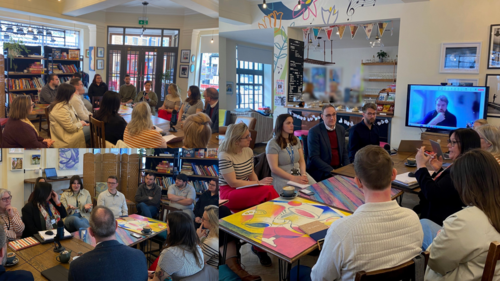New coalition of charities and support groups joins local MP to warn of dire consequences of Government’s benefits cuts

A coalition of local support groups and charities, together with Ian Sollom MP, has warned that people with disabilities and those caring for them are ‘terrified’ about the Government’s planned benefits cuts, and that frontline services will be left unable to cope with the demands.
The stark warning from representatives of organisations helping vulnerable people came during an emergency meeting organised by Ian, in the wake of the Government’s announcements last month. Many people claiming Personal Independence Payments (PIP), the health element of Universal Credit (UC), as well as carers receiving Carer’s Allowance will no longer be eligible to claim these benefits under Government plans.
Ian, the Liberal Democrat MP for St Neots and Mid Cambridgeshire, organised the forum following a huge increase in letters and emails from worried constituents and organisations. He was keen to hear from the services directly about the impact on them and their users, and how he can work with and support them.
The group of representatives, which aims to meet regularly in the future, met at the Citizen Hub in St Neots and is made up of Citizens Advice Bureau (Cambs Rural and Cambridge City); St Neots Foodbank; Money Advice Service St Neots (MAST); Cambridgeshire ACRE; charity Switch Now; Cambridge City Foodbank; Citizen Hub, Inspire 2 Ignite and Carers UK.
During the discussion each of the representatives spoke about the impact the proposed cuts are already having on people and the concerns they have for the future. The organisations pointed out that for most people on PIP, the money is used for day-to-day budgeting not directly on support for their health needs and to take this away will throw people into poverty.
Ian said: “I am very grateful to all those who attended the meeting and shared their experiences, concerns and ideas. We understand that changes need to be made to the welfare system, and we do know that meaningful employment can provide significant mental health benefits for many people. However, taking money off people with disabilities, and in turn their carers, is not the right approach. There is no evidence that reducing benefits results in people finding work.
“I will be strongly opposing the Government’s proposals on these benefits cuts. And if the Government is determined to go ahead as planned, I will use the information from the people I met today to advocate for changes in the legislation that will protect the most vulnerable people from the worst impacts of these cruel reforms.”
Concerns the organisations and charities expressed included:
- The new PIP scoring system will see people needing to score 4 points out of 12 for one of the basic daily living activities such as getting dressed, washing yourself etc. But this means those who score lower across many criteria, will see support withdrawn, even though they clearly need it.
- People will still require support to enable them to work but who will provide this as social and healthcare sectors are already overloaded?
- While the slight increase to Carer’s Allowance is welcomed by Carers UK, they explained that as PIP is the gateway benefit for receiving this payment, the changes will result in a £500m reduction to the money available for carers.
- Delaying access to the health element of UC until someone is aged 22 is cruel and punishing younger people.
- The psychological impact of sudden, impersonal letters from the DWP and a lack of time for those affected to prepare. Communication surrounding these changes must be accessible, compassionate and provide details of organisations that can support them.
- For people with disabilities of all kinds, living costs more in general and therefore people will need to receive financial support whilst they are trying to break down the barriers to work. They can’t just start a job and be ok.
- There will also be costs in terms of childcare and transport to consider.
- Many organisations that already support people won’t have adequate funding to cope with increased demands.
- Many more people will need to use foodbanks, but it is likely that they will receive fewer donations and volunteers as an indirect impact of the cuts.
